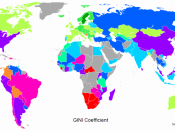Goods and services now move more freely among countries than ever before. Ongoing declines in the cost of long-distance communication and transportation and in national restrictions on international trade and investment have allowed economies around the world to become increasingly integrated, thereby enhancing productivity growth and expanding consumer choices. In parts of the developing world and especially in East Asia, globalization has been accompanied by an increase in living standard hardly imagined just a generation ago. At the same time, globalization has also become the focus of widespread controversy. In particular, concerns about adverse consequences for income distribution have fueled policy initiatives that threaten to turn back the clock.
An especially troubling development was the emergence of a popular backlash to globalization in the United States, even when the country was enjoying record growth and the lowest unemployment rate in decades. An article in The Economist ("Globalization and the Rise of Inequality," January 18, 2007), written while the U.S.
economy was expanding, highlights "a poisonous mix of inequality and sluggish wages" as the force underlying a globalization backlash in the United States as well as Japan and the European Union. Once America's long period of expansion reached an abrupt end, market-opening trade accords such as the North American Free Trade Agreement (NAFTA) became lightning rods for public concern about stagnating real incomes, job losses, and increased economic insecurity.
In the midst of the global recession that followed, most Americans and their counterparts abroad continued to acknowledge the benefits of globalization in terms of overall productive efficiency, lower prices, and increased consumer choices. The backlash, both in the United States and worldwide, has largely been a response to the perceived redistributive consequences of increased openness, especially openness to imports and immigration. Even if a country "as a whole" is made better...


